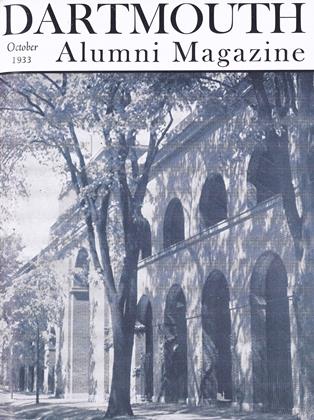YET AGAIN has the Alumni Fund shown its actual value to the College in dollars and cents. But, speaking for the alumni, have we done enough? Is our record as good as it might, or should, have been?
Dartmouth finances and the Dartmouth Alumni Fund are firmly woven together, intertwined by bands of tradition and threads of accomplishment that have stood the stress of hard times and the strain of discouraging deficits. Through the years, the Fund has meant financial salvation to the College. It has brought dollars that, not available, would have placed strict limitations on progress in Hanover. Time was when Alumni Fund appeals were desperately made to "keep Dartmouth out of debt." In the later, the fat, years a contribution became an "Investment in Dartmouth." With the recurrence of lean years came another period of pinching need, a time of mounting annual deficits. In spite of all of this, the keynote for the past campaign for alumni gifts was "No Quota—No Pressure." Adopting such a policy was a considerate decision to make, typical of President Hopkins' administration. The College waived all privilege of urging alumni to give, feeling that too many Dartmouth men were in hard circumstances to impose a strain upon their loyalty.
The treasurer reports that there is a deficit for the year ending June 30 of about $43,000. This would have been appreciably greater had it not been for two factors. Mr. Edward Tuck '62 added a gift of $20,000 to his many thoughtful contributions. The reduction in faculty salaries in June permitted a redistribution of reserves held for sabbatical leaves, thus releasing funds for current uses. Mr. Tuck's gift was made for application against operating expenses for the past year. These two contributions to the year's income were of great importance. Alumni will find, in studying Mr. Edgerton's financial report, that affairs have been well handled. It is regrettable that returns from dormitory rentals have decreased in a period when these are sorely needed. Yet of all types of investment dormitories show the highest percentage of return, 5.1%. This figure was 6.1% last year.
The hard-working class agents and members of the Alumni Council may take pride in reflecting upon the success of the Fund in contributing $67,200.40 to the College coffers. To this figure might well be added the income of $4,827.83 from the General Fund, a reserve that has been built up as success of the Fund in certain years has justified contributions to it. Actually, then, the Fund total for the year was $72,028.23. That this result was secured at a campaign expense of nearly $1,500 less than last year is gratifying. Total expenses of $6,080.09 compare favorably with $7,463.05 of expenditure in 1932, and $11,210.48 in 1931. There has been, this year, greater participation of younger classes in the Fund, a thing which is, and rightly, a major objective of the committee in charge. To John Sterling '11 and A. I. Dickerson '30 goes the appreciation of Dartmouth men for their able direction, as chairman and secretary of the Fund committee, of the '33 campaign. They, and the class agents, have served nobly.
But are the alumni content that the Fund should fall so far short that there is a College deficit of over $40,000? Yet more to the point, are we satisfied with the showing when only 4,746 men contributed, the smallest number since 1924? The percentage of contributors this year was 50%. The average for the past eight years is 68%. The number of contributors has materially decreased, yet the total number of alumni has been increasing by about six hundred every year.
A young alumnus inquired in July as to the final standing of the Fund on June 30. His reaction was "That's a lot of money to collect in a year like this, but what's the matter with the number of contributors?" He was disappointed. Alumni generally regret, too, that more men don't give something—not in four figures, three, or even two—but in terms of the mite, the gift that shows interest in Dartmouth and concern for its welfare.
 View Full Issue
View Full Issue
More From This Issue
-
 Article
ArticleHANOVER BROWSING
October 1933 By Rees H. Bowen -
 Article
ArticleNEW COLLEGE RESPONSIBILITIES
October 1933 By Ernest Martin Hopkins -
 Class Notes
Class NotesClass of 1930
October 1933 By Albert I. Dickerson -
 Article
ArticlePRESIDENT'S ADDRESS TO THE ALUMNI
October 1933 -
 Article
ArticleARE WE GOING TO WIN?
October 1933 By Pat Holbrook '20 -
 Class Notes
Class NotesClass of 1910
October 1933 By Harold P. Hinman








